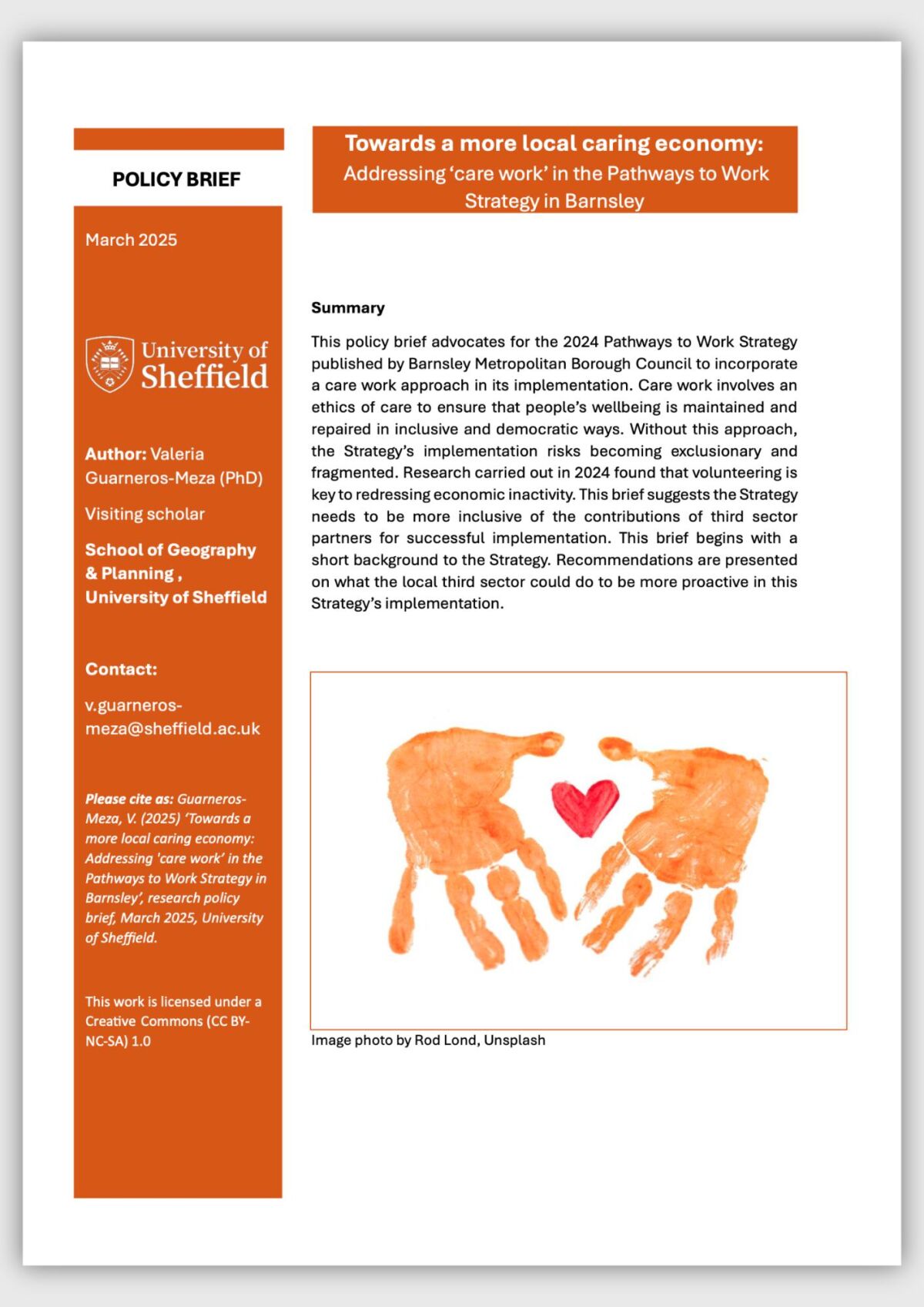Neighbourhood-based strategies around employment must also value the role care plays.
Author: Valeria Guarneros-Meza
In May 2025, Citizen Network prepared Neighbourhoods of Care: A strategy for South Yorkshire (see the link to the article below). This document recognises how an ‘ethics of care’ can be applied to different policy arenas beyond health and social care. With an emphasis on the neighbourhood, the promotion of work and employability can follow this caring approach.
The Pathways to Work strategy of Barnsley Metropolitan Borough Council (BMBC) is a good example in which central funding has been refocused to the neighbourhood. However, research I carried out in Barnsley in 2024 shows that in practice there are some gaps in fulfilling the potential pursued by an ‘ethics of care’ perspective.
In a policy brief I wrote, Towards a more local caring economy (the link to download the pdf is below), for voluntary and community organisations I underline how volunteering of people and communities on the everyday is overlooked by the Pathways to Work strategy. Although the BMBC is aware about the value of volunteering in caring for place and people, the strategy omits this aspect.
Also, the element of race is overlooked in the strategy. The Work Foundation has calculated that in South Yorkshire, BAME people are more likely than native-White populations to carry out precarious forms of work. Barnsley is the local authority in the region with the highest proportion of people in precarious-type jobs. Regardless of race, people experiencing this type of precarity are more likely to rely on their immediate communities to find ways of overcoming the limitations of precarious work, such as unstable and low incomes, which in turn push people to rely more on their communities for solidarity and support around care.
The socio-economic trauma that Barnsley communities have encountered over the past 40 years have motivated people to find ways of moving on and coping with challenging circumstances. Behind reports of high levels of multiple deprivation, some communities in Barnsley have moved on through volunteering activities that care for others and their neighbourhoods, which gradually build on people’s personal confidence to start looking for more secure jobs.
Without this volunteering and collective care, the search for better jobs would be unlikely for native communities and immigrants alike. Despite the popular rhetoric of anti-immigration and racism, the challenges for both groups are similar, while their reliance on volunteering and collective care are key to overcome defying circumstances.
In the policy brief I recommend for the BMBC and the voluntary sector to work closer together; for local councillors and trade unions to build better links and information exchanges between VCSE organisations and the channels the BMBC creates; and for these exchanges to be more inclusive of labour integration not only for native populations but also for new arrivals that are non-White.
It is good to hear that local government officers are implementing Pathways to Work alongside the Barnsley CVS, but there is more that could be done for the implementation to value the voluntary work that is necessary in the process and to be more inclusive of all vulnerable groups in the population. Open recognition of these two things is basic for an ‘ethics of care’ approach in the arena of work and employability to be realised.
Read and download the free pdf in your browser, link below.

Valeria Guarneros-Meza is an Independent researcher affiliated to the University of Sheffield and York St John University.
The publisher is Citizen Network. Work and Neighbourhoods of Care in Barnsley © Valeria Guarneros-Meza 2025.
local government, Neighbourhood Care, work & employment, England, Article